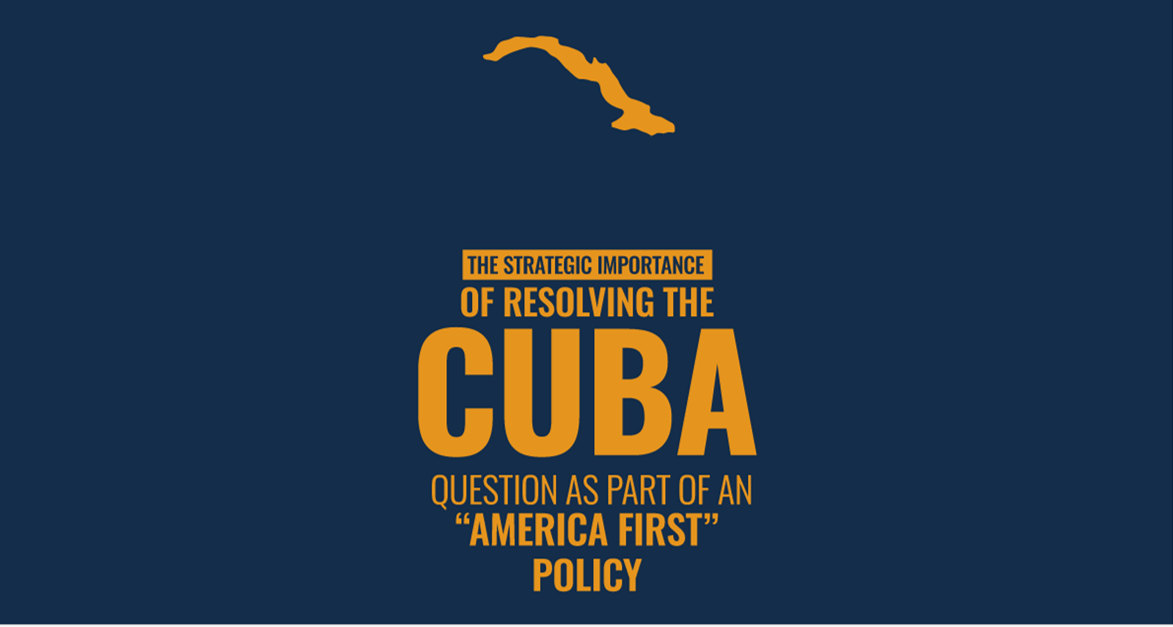
The Strategic Importance of Resolving the Cuba Question as part of an “America First” Policy
This work is adapted from comments given to a forum “Cuba Today: 67
Years of Dictatorship,” featuring distinguished Cuban dissident Jose
Daniel Ferrer. The forum was held by the Interamerican Institute of
Democracy in Miami, Florida on November 12, 2025. Within that event, my
comments focus on the strategic implications for the U.S. and the region of
the continuation of the Communist Cuban dictatorship, and opportunities
and imperatives arising from the present expansion of U.S. emphasis on the
region, to strengthen containment of Cuba and use it to impact the
trajectory of the Cartel de los Soles terrorist organization in Venezuela, as
part of an “America First” strategy.
With the new policies of the Trump Administration, we are at a strategic
inflection point with respect to both Cuba and the Caribbean more broadly,
with opportunities and risks that go beyond what happens in Venezuela, or
with narcotrafficking.
The Caribbean is the U.S. southeast maritime border. It is a key route for
drugs and irregular migration to the United States but also host to numerous
commercial shipping lanes connecting both North and South America to
the Pacific. From a national security perspective, some of the most sensitive
U.S. military installations are located in or near the Caribbean. In time of a
war in the Indopacific, U.S. warships, many military supply ships, and those
carrying key heavy equipment to the warfight, would naturally pass through
the region, not far from Cuba.
As we saw during the Cuban Missile Crisis, Cuba’s geographic location, both
proximate to the United States, and central to the Caribbean, makes it and
the activities of its Communist regime, of significant strategic importance
to the U.S.
As the Trump Administration dedicates expanded attention, military and
other resources to the region, it is important to remind ourselves why
dealing decisively with Cuba is central to the success of the Administration’s
“Americas First” agenda.
First, Cuba continues to host extra-hemispheric U.S. adversaries, including
conducting significant military engagement with them.
Just last year, it hosted the Russian missile frigate Admiral Gorshkov, and
the nuclear submarine Kazan in the Port of Havana.
The U.S. government has recognized that the PRC operates military signals
intelligence facilities in Cuba, including at Bejucal. The Center for Strategic
and International Studies has identified four likely Chinese ELINT sites on
the island, that could be used to observe the activities of U.S. installations
such as JIATF-South, the movements and electronic signatures of U.S.
warships, aircraft, and submarines, and possibly even host hostile forces
targeting them.
Miguel Diaz Canel was just in China in September 2025 for its annual
military parade and for consultations with PRC leadership.
Cuba has also publicly collaborated with Iran, with former Iranian
President Ashtiani visiting the Island in December 2023.
Cuba has also been key to the survival of Venezuela’s authoritarian
Bolivarian regime since the beginning of the Hugo Chavez Presidency,
serving as a key intellectual author of its hijacking of Venezuelan
democracy, and supplying intelligence personnel and other resources to
help Chavismo maintain control over its population. That support has thus
indirectly enabled Venezuela current criminal activities killing U.S. citizens,
both through drugs and violent criminal gangs such as Tren de Aragua
preying on desperate Venezuelan migrants.
Cuba has also participated in the intellectual authorship of anti-U.S. radical
left movements from the regimes of Rafael Correa in Ecuador and Evo
Morales in Bolivia, to attempts to sabotage democracies in Ecuador and
Chile in 2019, Colombia in 2020, just to name a few.
Cuban espionage has also long targeted both the United States and the
destabilization of democratic partners in the region. These include the
Cuban Five, Ana Montes, and most recently, Manuel Rocha who long had
access to the highest level US government officials and secrets, and shaped
US policy in the Americas.
As the Trump Administration focuses on migration and drugs, it is
important to recall that over a million persons have left Cuba since 2020 due
to its repression and economic collapse. In addition, it was not by
coincidence that Chinese fentanyl trafficker Zhi Dong Zhang, known as
“Brother Wang”, sought refuge in Cuba, after escaping jail in Mexico.
I do not advocate US military intervention in Cuba. I do, however, advocate
that President Trump Administration seize the opportunity of the expanded
US presence in the Caribbean, to double down on the posture he adopted in
his first term, of aggressive containment, to reduce Cuban opportunities to
undermine US interests in the hemisphere.
As the US ramps up pressure in Venezuela, it should privately demand that
Cuba stand down its intelligence presence there that has helped identify and
deter Venezuelan military and other elites defecting from Maduro, if Cuba
wishes to be exempted from the list of U.S. targets supporting the Cartel de
los Soles criminal franchise running Venezuela.
The U.S. should demand Cuba PRC, Russian, Iranian and other military
operations from Cuban soil, and Cuban cooperation with subversive
movements in the region.
While I believe a democratic, U.S. friendly Cuba is ultimately necessary for
U.S. security and prosperity in the region, I believe that aggressive
containment is the most prudent path in the near term. That containment,
however, should also be accompanied by US support for the Cuban people’s
access to information, engagement, and political rights, to expose the
fissures in the regime that will pave the way for the end of Communist Party
rule and Cuba’s re-integration into the family of democratic nations.



